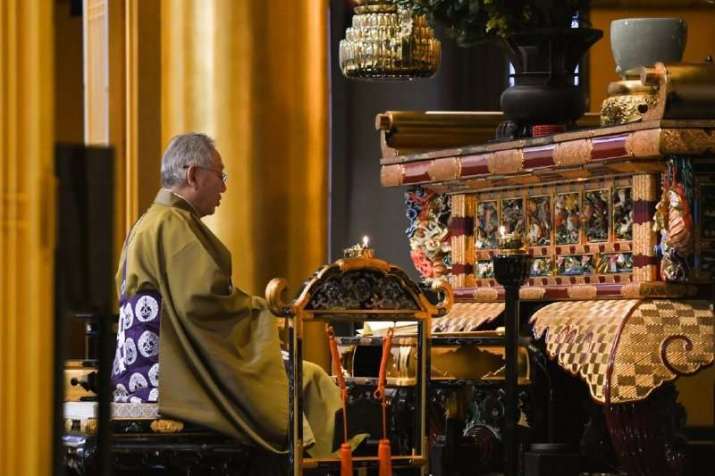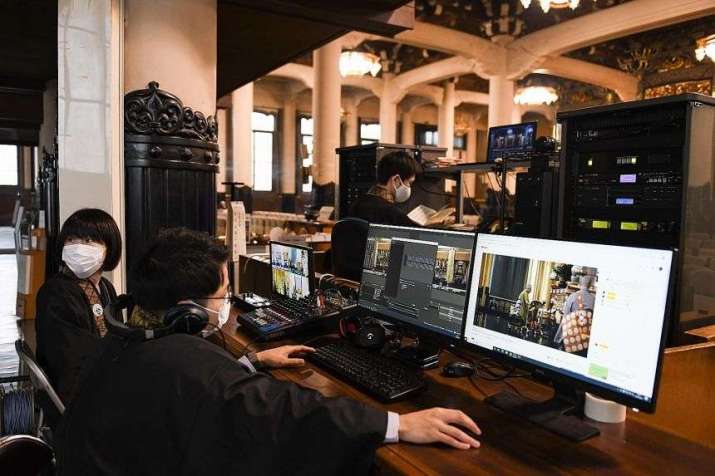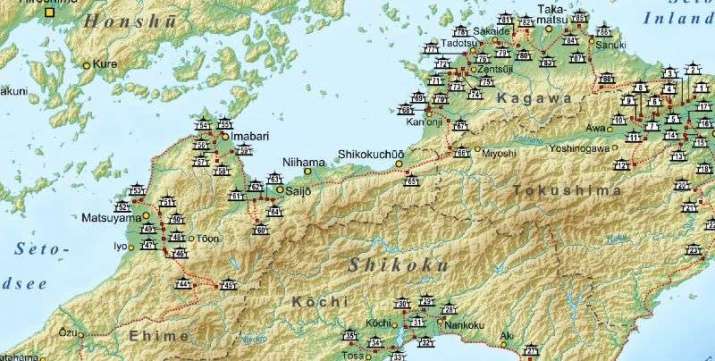
With Buddhism in Japan already receding in recent decades, the coronavirus pandemic has forced temples to be creative to maintain revenue. A number of innovations and new takes on old practices have helped keep Japan’s approximately 77,000 Buddhist temples operating, from the creation of a new Zen meditation app, to hosting online memorials, and partnering with local sake (rice wine) makers.
Ryosoku-in, a Zen temple in Kyoto, has introduced a meditation app that has already been downloaded more than 15,000 times. The temple uses the app to organize online Zen meditation dubbed UnXe, or “cloud sitting.”
“When we lost visitors and donations fell, we realised that our conventional way of supporting our operations no longer works,” said Toryo Ito, deputy chief priest at Ryosoku-in. “We need to adapt to a management style which meets with the times.” (Bloomberg)

Tsukiji Hongwan-ji, a Jodo Shinshu temple in Tokyo, has also found innovative ways to carry on through the pandemic. In May last year, when SARS-CoV-2 first began to spread widely in the country, the temple began offering online memorial services so that family and friends of the diseased could attend while maintaining social distancing. Since then, the temple has offered around 70 online memorial services, or nearly two per week.
Yugen Yasunaga, a representative director and priest at Tsukiji Hongwan-ji, said that they had ventured into other new services as well, including matchmaking and yoga classes. “Just like Amazon.com responds to the various needs of customers online, a temple can do the same,” he said. (The Straits Times)

Along the famous Shikoku pilgrimage route, a circular route visiting some 88 temples on Japan’s southwestern island of Shikoku, Buddhists are teaming up with local sake makers for mutual promotion. Some 50 sake makers on the island have agreed to print labels depicting the 88 temples, in a bid to enhance the status of the pilgrimage for possible listing as a world heritage site. A portion of proceeds from the sale of the sake will go to the pilgrimage tour office to offset losses during the pandemic as fewer pilgrims have taken part in the journey.
In Japan, both Buddhism and Shinto are widespread, with some 79.2 per cent of the population identifying as practitioners of Shinto and 66.8 per cent practicing Buddhism. At the same time, a majority of the population identifies as atheist. This may be because, as scholar Dr. Jason Ananda Josephson has noted, the Japanese word for religion, shukyo, was only developed in the 19th century as a response to colonialist influences and thus does not hold the same meaning as found in English.
In 2015, a report suggested that Japan’s Buddhism is approaching a point of crisis. As demographics shift and rural participation at temples wanes, more than one-third of Japan’s temples may close by 2040.* Over the last several years, Buddhists in Japan have embarked on a number of unique ways to promote the religion and increase funding. Over the same time, however, and especially amid the current pandemic,** Japanese temples have offered an outpouring of support to individuals and communities in need.***
* Almost One-third of Japan’s Buddhist Temples Expected to Close by 2040 (Buddhistdoor Global)
** Buddhist Temple Offers Spiritual Refuge for Japan’s Vietnamese Community (Buddhistdoor Global)
*** Japanese Buddhist Temples Share Devotional Offerings with Disadvantaged Families (Buddhistdoor Global)
References
Josephson, Jason Ananda. 2012. The Invention of Religion in Japan. The University of Chicago Press.
See more
Zen apps, online services keep Japan’s Buddhist temples afloat (The Straits Times)
Coronavirus: Japan’s Buddhist temples turn to online funerals, Zen apps to survive as pandemic dents income (South China Morning Post)
Shikoku Pilgrimage temples and local sake makers cooperate to overcome coronavirus (Nippon)














